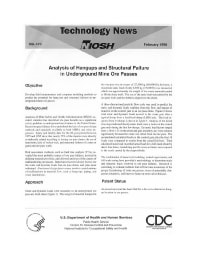Mining Publication: Technology News 470 - Analysis of Hangups and Structural Failure in Underground Mine Ore Passes
Original creation date: February 1998
Authors: BM Stewart, SR Iverson, ET Cullen
NIOSHTIC2 Number: 20000576
Spokane, WA: U.S. Department of Health and Human Services, Public Health Service, Centers for Disease Control and Prevention, National Institute for Occupational Safety and Health, Technology News 470, 1998 Feb :1-2
Analysis of Mine Safety and Health Administration (MSHA) accident statistics has identified ore pass hazards as a significant safety problem in underground metal. mines in the United States. Recent ore pass failures have underlined the lack of ore pass design methods and standards available to both MSHA and mine engineers. Injury and fatality data for the 20-year period between 1975 and 1995 show that nearly 75% of the injuries were directly or indirectly related to pulling or freeing ore pass chutes, the use of hand tools, falls of broken rock, and structural failures of chutes of gates and ore pass walls. Risk assessment methods, such as fault tree analysis (FTA), revealed the most probably causes of ore pass failures, assisted in defining research priorities, and allowed analyses of the chutes of malfunctioning ore passes. Important structural design factors are the static and dynamic loads that ore pass chutes and gates must withstand. Functional design factors may involve consideration of malfunctions in material flow, such as hang-ups, piping, and water inundations.

NIOSHTIC2 Number: 20000576
Spokane, WA: U.S. Department of Health and Human Services, Public Health Service, Centers for Disease Control and Prevention, National Institute for Occupational Safety and Health, Technology News 470, 1998 Feb :1-2
- Application of Physical Modelling and Particle Flow Analysis to Evaluate Ore-pass Design
- Assessing and Monitoring Open Pit Mine Highwalls
- Development of a Mine Hoist and Ore Pass Research Facility
- The Effects of Disaster on Workers: A Study of Burnout in Investigators of Serious Accidents and Fatalities in the U.S. Mining Industry
- Performance of a Light-scattering Dust Monitor in Underground Mines
- Safety Considerations for Transport of Ore and Waste in Underground Ore Passes
- Technology News 458 - Development of a Research Facility to Improve Mine Hoisting and Ore Pass Safety
- Technology News 469 - Sensors Warn of Hazards During Mine Hoisting
- Toolbox Training For Construction Aggregate Miners
- Visual Performance for Incandescent and Solid-State Cap Lamps in an Underground Mining Environment